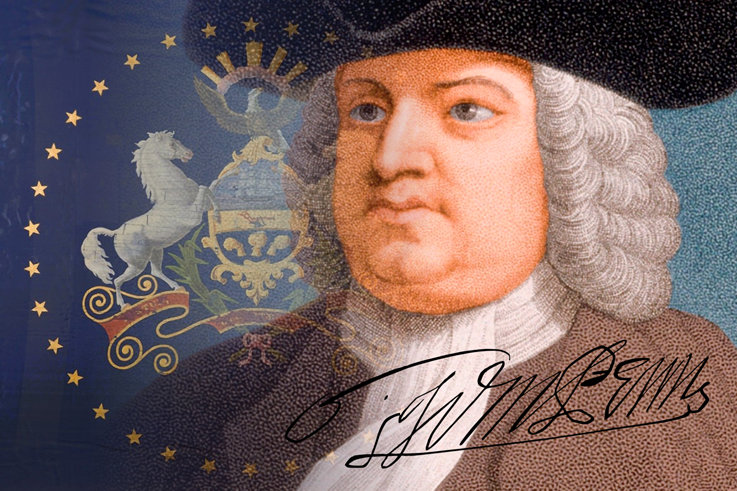
-
HOME
-
WHAT IS STANDOur Mission Our Values Our Help Contact
-
WHAT WE FIGHT FORReligious Freedom Religious Literacy Equality & Human Rights Inclusion & Respect Free Speech Responsible Journalism Corporate Accountability
-
RESOURCESExpert Studies Landmark Decisions White Papers FAQs David Miscavige Religious Freedom Resource Center Freedom of Religion & Human Rights Topic Index Priest-Penitent Privilege Islamophobia
-
HATE MONITORBiased Media Propagandists Hatemongers False Experts Hate Monitor Blog
-
NEWSROOMNews Media Watch Videos Blog
-
TAKE ACTIONCombat Hate & Discrimination Champion Freedom of Religion Demand Accountability
Jailed for His Beliefs and Cast Out by His Family, William Penn Was a Bulldog for Religious Freedom
“Right is right, even if everyone is against it, and wrong is wrong, even if everyone is for it.”
—William Penn
William Penn knew what he wanted, even when his pursuit of it marked him as a rebel of the highest order.
He started early. In 1662, at age 18, he was expelled from the University of Oxford over his refusal to comply with its mandated daily chapel attendance.

Then he quarreled with his father, the eminent Admiral William Penn, throwing the older man into such a rage that he attacked his son with a cane and ran him out of the house. His mother, begging for peace in the family, coaxed him back home, but his arguments in favor of free will frightened his mother. With her husband’s career and her own social standing in jeopardy from their teenage son’s radical ideas about religious freedom, she sent him away again.
William Penn simply didn’t fit in. He had sipped from the goblet of freedom and found his thirst yet unquenched. So, despite the constant threat of imprisonment or worse, he continued to live out his credo: “I never had any other religion in my life than what I felt.”
“My prison shall be my grave before I will budge a jot, for I owe my conscience to no mortal man.”
Penn also didn’t care about the consequences of his choices as long as he was true to himself. At age 22, he found a spiritual haven in the new Quaker faith—a denomination that had no rituals, no clergy, no original sin, no sworn loyalty to a king and whose God could communicate to any individual with no ecclesiastic intermediary needed. The faith, however, was banned and Penn was arrested and imprisoned in 1666 in Cork, Ireland. He was released shortly thereafter solely on the strength of his father’s good name. But after Penn still refused to change his rebellious ways, his father made the severance permanent, throwing his son out and cutting him off from his inheritance.
Homeless now and dependent on the kindness of friends, Penn began preaching and writing tracts against the restrictive practices in his country. For his efforts, he was jailed in 1668 in an unheated cell in the Tower of London and threatened with life imprisonment unless he publicly recanted his writings. He was given pen and paper to draft an apology, but instead wrote his famous essay “No Cross, No Crown,” which exhorted his fellows to return to the “primitive Christianity” of love and tolerance for all.
At the age of 24, the stubborn young Quaker who refused to back down was now a source of embarrassment to the Crown. An effort to meet him halfway prompted this defiant rejoinder from Penn: “My prison shall be my grave before I will budge a jot, for I owe my conscience to no mortal man.”
Soon thereafter, he was released, having outlasted the Crown with his persistence.
Two years later he was arrested again, this time on the charge of violating a law forbidding the right of assembly to “more than five persons… for any religious purpose not according to the rules of the Church of England.”
The trial was a sham. The judge forbade the jury from hearing the defense, commanding them, in effect, to find Penn guilty. In a display of extraordinary courage, the jury found him not guilty.
The enraged judge threw the jury in jail, warning, “You shall go together and bring in another verdict, or you shall starve.” Still, they refused to reverse their verdict. Suing for a trial, then fighting and winning their case from prison, Penn’s defiant jury ultimately wrested the right for all English juries to be free from the control of judges.
Penn’s father, meanwhile, had come to respect his son’s courage and integrity. Dying, he sought reconciliation, telling his son, “Let nothing in this world tempt you to wrong your conscience.” He arranged to have the Crown give his son property in British America as payment for a debt the king owed the Penn family.
And so in 1681, William Penn went from homeless rabble-rouser to the world’s largest private non-royal landowner: 45,000 square miles—a vast swath of real estate now known as Pennsylvania (so named, not by Penn, but by King Charles II in honor of the elder Penn).
The younger Penn knew precisely what to do with what he called the “Holy Experiment.” He drafted a charter of liberties for the new land, guaranteeing freedom of religion, freedom from unjust imprisonment, free elections and other rights that have also found their way into our nation’s hallowed founding documents.
Penn’s creation was a wonder at the time. Pennsylvania became the first true melting pot of all faiths. From all over Europe they came—Anabaptists, Mennonites, Amish, Lutherans, Jews, Huguenots, German Catholics and others—all fulfilling Penn’s dream of religious freedom. The French writer Voltaire called Pennsylvania the only government on Earth that responded to the people and respected minority rights.
William Penn’s thirst for religious freedom, which he was willing to be disinherited over, jailed for and risked his life upholding, could be summarized by his phrase “all persons are equal under God”—an idea that, thanks to him, is as familiar in our time as it was radical in his own.









